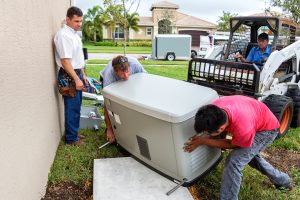 A generator can be a lifesaver when Mother Nature decides to take wind and cut off the power. The last thing you need is to find out that your generator system needs repairs in the middle of a crisis when reliable electricity is absolutely essential. Winter storms can often knock out the power here in New England, but so too can summer floods and electrical storms. With the coming of spring comes the time to schedule a maintenance session for your whole-house generator.
A generator can be a lifesaver when Mother Nature decides to take wind and cut off the power. The last thing you need is to find out that your generator system needs repairs in the middle of a crisis when reliable electricity is absolutely essential. Winter storms can often knock out the power here in New England, but so too can summer floods and electrical storms. With the coming of spring comes the time to schedule a maintenance session for your whole-house generator.
What Is It?
A maintenance session isn’t quite the same as a repair job, which is intended to address a specific problem. Instead, it’s intended to address any potential problems before they interfere with the generator’s ability to function, as well as a chance to spot repair issues and take care of them before your generator is needed. A typical generator maintenance session will include the following:
- Checking for loose or frayed wires and burnt spark plugs, and replacing them when necessary.
- Ensuring that the gas lines are sound and fitted properly. (This includes natural gas lines as well as diesel fuel lines, depending upon the type of generator that you own.)
- Checking the vents and exhaust lines to make sure they’re not clogged.
- Lubricating moving parts and removing the dust from key components in the system.
- Testing the battery and other electrical components to ensure that they’re still working.
- Checking the system for signs of corrosion and rust.
- Running the system for 15 to 20 minutes and watching for any signs of a problem that may be developing.
What are the Benefits?
The main benefit of checking your generator, as stated before, is to prevent any nasty surprises at the worst possible time. Trained technicians know what kind of details to look for and can make changes you need very quickly. If further repairs are called for, they can go over the details with you before the issue pops up to bite you, and you can schedule a time to take care of them to make sure you’re ready to go when your generator is needed.
Beyond that, the issue becomes one of efficiency and longevity. All of those little issues can take quite a toll on the generator over time, even if they aren’t immediately apparent. In the first case, they can make your system much less efficient. Not only will that cost you more in used fuel, but in the case of diesel generators, it can even cause you to run out of fuel faster than you might. Generator maintenance helps avoid that by improving efficiency and allowing your system to work at its best when you need it to. When applied regularly over time, they can extend the life of your generator, and if you have an older generator past its warranty expiration date, a maintenance session can help keep it ready for whatever you may require.
If you have a generator in your Reading, MA home, and need a maintenance session for it, call on Cooling Unlimited, Inc. today.

